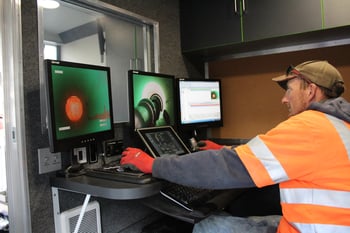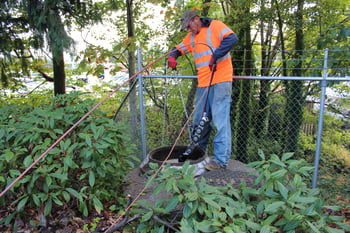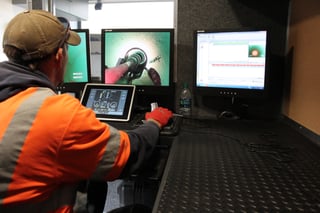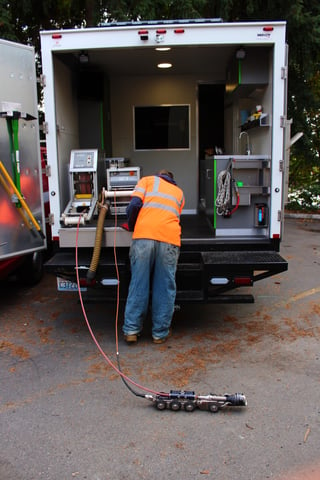 Founded in 1954, Innovac had humble beginnings as a residential duct cleaning company. Over time it expanded its offerings to include commercial duct cleaning, industrial vacuuming and CCTV pipeline inspection. In 2014, the company changed ownership and Nirpaul Kang was brought on board as the Director of Business Development & CCTV Operations. Once hired, he identified opportunities that his division could capitalize on to increase revenue and service its customers better.
Founded in 1954, Innovac had humble beginnings as a residential duct cleaning company. Over time it expanded its offerings to include commercial duct cleaning, industrial vacuuming and CCTV pipeline inspection. In 2014, the company changed ownership and Nirpaul Kang was brought on board as the Director of Business Development & CCTV Operations. Once hired, he identified opportunities that his division could capitalize on to increase revenue and service its customers better.
“The market was shifting and our customers' needs were increasing—we needed to act on those needs to stay relevant,” says Kang. At that time, Innovac’s pipeline inspection division only performed mainline inspections. Lateral inspection services were in demand and it was worth exploring further.
Innovac is based 20 miles north of Seattle, WA, a region known for its heavy precipitation and hilly terrain. These conditions sometimes make inspecting laterals from residential cleanouts difficult because of extended lateral lengths and fall issues. “Many of our residential lateral inspection projects required a lateral launch camera,” explains Kang. “Residential customers, commercial clients and governmental agencies were repeatedly coming to us with requests to inspect laterals from the mainline. We were losing clients because they were opting to hire contractors who could offer more than just mainline inspection work,” says Kang. “And having to refer customers to other companies that could offer these services was just bad for business.”

The need to invest in lateral launch capabilities was apparent, however it came with its own set of challenges. “Having just come on board and proposing the purchase of a lateral launch system was a risky proposition,” says Kang. Lateral launch systems allow inspection of laterals from an adjoining mainline. They’re deployed similar to a sewer inspection crawler, except the crawler has a secondary camera that it pushes into lateral connections. “The price tags on the systems are high, and one bad purchasing decision could have extensive ramifications to our business," Kang says. "But the proof was in the demand, with the dangers of cross bores becoming more evident and inflow and infiltration problems gaining attention.” To further increase demand, the City of Seattle passed an ordinance in 2015 requiring homeowners to complete lateral inspections before any major structural renovation to homes. “We needed to capitalize on these trends; there was money to be made in lateral inspections, and we needed to get on it,” Kang says.
In January of 2015, Innovac purchased its first lateral launch SAT system from Envirosight, and their fears were quickly allayed. “Within two weeks of purchasing our system we were doing lateral inspection projects,” says Kang. “In fact, every year since getting into lateral inspections we’ve increased our revenue by at least 25%.” Being able to perform these inspections has opened doors for Innovac, from working with engineering companies who need to research the makeup of underground utilities, to developers who need pre-acceptance sign-offs. Kang attributes his success in offering lateral inspections to three factors: strong communication with clients, a well-trained crew and robust equipment.
Innovac’s crew believes clear communication between project managers and clients is the cornerstone to any project’s success, but it is even more important in the case of lateral inspections. “Innovac’s clients range from residential customers to engineering firms, from municipalities to utility owners,” says Kang. “It is imperative we understand the needs of our clients from the get-go. The field crew should know whether they are looking for a blockage, a cross bore, or whether they are trying to locate underground assets, because these goals will determine the way they approach the inspection. The more information we have from the client, the more successful our crew is going to be in the field.”

Management at Innovac takes training the inspection crew very seriously. Training plans include working with manufacturers to thoroughly understand the equipment they use; PACP, MACP, and LACP certification; and on the job training on the ins and outs of inspecting laterals. “We don’t just throw new crew members out in the field to inspect laterals—they have to be confident in what they’re doing,” says Kang. “My crew represents Innovac whenever they are in front of a customer; they should be able to discuss the project on hand as an expert and be able to handle any curveball thrown at them while they are doing the inspection. Innovac has five crew members that are PACP/MACP/LACP certified, and one of them is required to be on the inspection truck whenever sewer inspection work is performed. Innovac deploys a two-person crew out on every inspection, whether it is a mainline or lateral inspection. One person follows with the locator and performs general site maintenance while the other is in the truck steering the camera, launching into the laterals and coding their observations. “We make sure our sewer inspection crew knows the equipment they are using inside out," Kang says. "They should know all of its functionality and know how to safely deploy it. A lot of times, equipment users blame equipment downtime on the manufacturer; the truth is that a lot of downtime can be avoided if operators know how to properly operate the equipment and know its limitations.”

Along with clear communication with clients and a well-trained crew, Kang believes having reliable equipment is crucial to running a successful lateral inspection program. “Prior to joining Innovac, I used lateral launch systems from many different manufacturers and started to favor Envirosight’s equipment for its uptime and ease of use,” he says. Innovac currently owns three CCTV vans, two of which are equipped with Envirosight’s ROVVER X SAT systems and one that runs an Envirosight Supervision crawler. “Features such as a top-feeding camera and being able to consistently have a visual on my lateral camera when launching are essential. Launching into laterals requires great precision on the part of the operator and equipment being used. Our SAT systems work flawlessly in bends and at different clock positions—we don’t have to torque the entire camera head to see what is going on, we just use the primary launch camera to get a visual on where we are going. Functionality is key when evaluating equipment—you need to be able to discern the bells and whistles from the features that will save you time and money while you’re inspecting the pipe.”
“When I look back, the decision to get into lateral inspections was imperative in shaping how our business is today,” says Kang. “Innovac is one of the leading CCTV inspection service providers in the Seattle area, and that is because we took the time to understand our market and assess its demands.” Since 2015, Innovac’s crew has successfully inspected over 2,500 laterals. “Getting into lateral inspections has opened opportunities for us and has been the guiding force in growing our business.”
Learn about the new ROVVER X SAT II and how you can diversify your service offerings click below:

